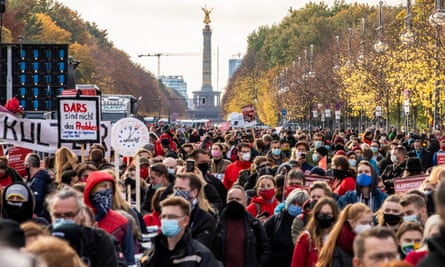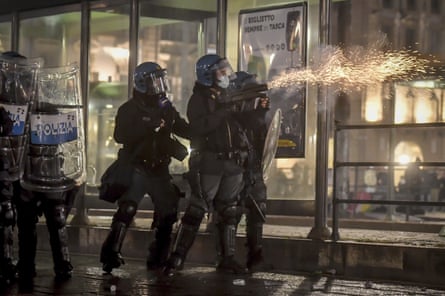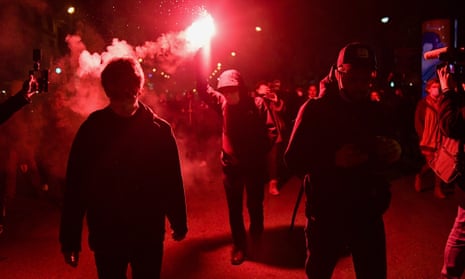As the second wave of Covid-19 filled hospital wards across Europe last week, and countries inched reluctantly towards varying degrees of partial lockdown, television schedules were cleared to allow leaders to address weary nations.
Announcing a 6pm curfew for the country’s restaurants and bars the Italian prime minister, Giuseppe Conte, called for national unity. “If we all respect these new rules during the month of November,” he said, “we will succeed in keeping the epidemiological curve under control. That way we will be able to ease the restrictions and move into the Christmas festivities with greater serenity.”
Speaking from the Elysée, a sombre Emmanuel Macron decreed a new national lockdown, lasting until at least 1 December, and warned France the new wave of infections was likely to be “deadlier than the first”. In Belgium, where Covid is spreading faster than in any other European country, the new prime minister, Alexander De Croo, hoped “a team of 11 million Belgians” would pull together to follow tighter regulations.
In tone and spirit, the messages echoed those delivered in March, when shock and fear led populations to rally round leaders and consent to restrictions unknown outside wartime. Eight months on, that kind of trust and goodwill is in short supply.
Europe, once again, is the centre of the global pandemic, accounting for almost half the world’s infections last week. But as desperately needed financial support fails to materialise, and track and trace systems fail to cope with the surge, there is public exasperation and, in some cases, open rebellion. On Friday evening, protestors threw molotov cocktails at police in Florence, in the latest outbreak of social unrest following Conte’s new rules.
Pino Esposito, a Neapolitan barber, is one of those who has lost faith in the orders coming from the top. In his home city, Esposito is leading a group of small businessmen in a campaign against the new restrictions. “We are protesting,” he says, “because all European governments, including ours, have found themselves unprepared for the second wave. Since March they were saying that, in October or November, the second wave would come and that it would be even more serious.
“But no preparation has been put in place for our schools, the health system, jobs, or the providing of incentives. And the financial support we were promised is not there to access. But businesses must have it if they are to stay closed and staff need unemployment money immediately.”
Across the continent, there is similar evidence of people facing dire economic hardship and psychological exhaustion. Earlier this month, a study from the World Health Organization reported widespread apathy and reduced motivation to follow public health guidance. The emotional toll of Covid-19 has been compounded by a growing scepticism in the capacity of governments to truly get on top of a crisis that is destroying people’s livelihoods as well as threatening their health.
According to the president of the European Central Bank, Christine Lagarde, the continent’s partial economic recovery in the summer and early autumn was “unequal, uncertain and incomplete”. As the second wave hits, she said in a recent interview, “it now risks being extinguished.”

From Milan to Manchester, and Marseille to Madrid, that prospect has sparked a wave of revolts. After the spring lockdown was eased, the subsequent patchwork of regulations and restrictions hit some workers, and regions far harder than others. The Spanish government’s decision to declare a six-month state of emergency has led to angry protests across the country and a bitter row with the conservative regional government of Madrid, which has accused it of overstepping its powers.
The mayors of nine cities, including Barcelona, Lisbon, Prague and Milan, have by-passed their national governments to write directly to the president of the European Council, Charles Michel, demanding access to the €750bn (£676bn) EU recovery fund. In Germany, where a partial lockdown beginson Monday, thousands of workers and employers in the arts and hospitality industries marched in Berlin last week, demanding greater financial support. Freelancers across the continent have fallen through the cracks of state support for those unable to work.

In Italy, a tipping point appears to be disturbingly close. Angry demonstrations erupted in Naples just over a week ago, after a local curfew was imposed. The protests were followed by civil disorder in Milan and Turin, where luxury stores were looted. “I think this is only the beginning”, says the Italian journalist and author of Gomorrah, Roberto Saviano. “In the first lockdown, Italians were united in the idea that this was an wholly novel emergency; a situation that any government would find difficult to deal with. Now they feel deceived.
“They’ve been told that things were going well, that we were winning. But their savings have been used up, they can see the problems with a testing system that isn’t working, and there is confusion and disagreement between the scientists. People have started to lose faith in the capacity of institutions to save them.”
A poll following last week’s mini-riots found that over three-quarters of Italians believe there will be more violence in the streets this winter.
“There will be unrest across Europe too,” says Saviano. “It will happen in different ways and with different catalysts, but it will come because the centre isn’t holding any more. We are a world away from the mood in March when it was a case of ‘we must follow the rules and protect ourselves or we will perish.’ Now some people think, well, I’m going under anyway if I can’t survive economically.”
The geographer Christophe Guilluy, whose books have charted the growing social divisions between provincial and metropolitan France, is similarly pessimistic about sustaining a mood of unity. Over the summer, local leaders in Marseille complained bitterly that a nighttime curfew and mask regulations had been imposed from Paris without due consultation. Macron’s move to a new lockdown, believes Guilluy, is already creating new divisions, as those with sufficient means insulate themselves from the worst of what is to come. On Thursday evening, huge traffic jams built up as Parisians attempted to flee the capital and head for second homes before a 9pm curfew. “The Parisians who have fled to their second homes,” he says “are running the risk of infecting inhabitants of provincial and rural areas. They have been very badly received.
“Inequalities between classes and between regions have been exacerbated by the pandemic. The truth is, social and cultural tensions have rarely been so acute in France, but the political classes are attempting to mask them by appealing to a sense of republican unity.”
Political rivalries and ambitions that pre-date the pandemic are also complicating the response to the second wave. In Belgium – where overwhelmed hospitals in Liège have asked Covid-positive medical staff to keep working – concerted action was stymied by high-profile disputes between politicians from the Flemish-speaking north and the Francophone south. The country has now locked down until mid-December. But the minister-president of Flanders, Jan Jambon, had previously claimed tough action was necessary only in Wallonia. By the time of his U-turn last week, 600,000 Belgians were believed to be spreading the virus.
“From May through June and right up until recently, you have seen a growing polarisation of opinion in public debate,” says Dave Sinardet, a political scientist from Saint-Louis University in Brussels. “The virologists would push for tougher measures, but there was a growing lobby for keeping the economy more open. So in September, when the infection rate was rising sharply, there was still a reduced level of restrictions. There’s a lot of criticism of the people who were giving that advice.”
The obvious failure of the country’s track and trace system is contributing to a sense of disillusionment with the management of the crisis. “There is frustration and a feeling that businesses such as cafes and restaurants did a lot, and the government didn’t do enough,” says Sinardet.
Boris Johnson will on Thursday add England to the list of European nations shutting down for a second time. According to Germany’s finance minister, Olaf Scholz: “November will be the month of truth”, in the battle against the second wave of Covid. But the indicators are that the struggle could go either way. The pace and intensity of the surge in infections has taken governments by surprise and left them looking unprepared. Public buy-in to a renewed lockdown, may need a step-change in the level of support and solidarity governments are prepared to offer. The financial cost will be enormous, but the price of inaction could be much higher.
In a column for La Stampa last week, the philosopher and former mayor of Venice, Massimo Cacciari, wrote: “A social crisis has been added to the public health one… [the crisis] is creating differences in income and living conditions which are completely incompatible with what we mean by a ‘democracy’. Are we aware of this? Up to now, I don’t think so. But there isn’t a moment to lose.”
The stakes were dramatically high before the first lockdown in March. They may be even higher now.
Additional reporting by Angela Giuffrida
